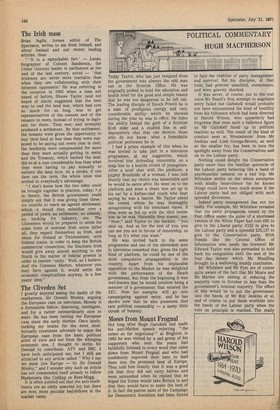The Irish mess
Brian Inglis, former editor of The Spectator, writes to me from Ireland, and about Ireland and our recent leading articles, thus: It is a remarkable fact' — Lucas, biographer of Colonel Sanderson, the Ulster Unionist leader in parliament at the end of the last century, noted — 'that Irishmen are never more tractable than when they are collaborating with their bitterest opponents.' He was referring to the occasion in 1902 when a man not heard of before, Shawe Taylor (and not heard of since) suggested that the best way to end the land war, which had cost so much for so long, was to get representatives of the owners and of the tenants to meet, instead of trying to legislate for them. They met; and promptly produced a settlement. By that settlement, the tenants were given the opportunity to buy their land at less than they were supposed to be paying out every year in rent; the landlords were compensated for more than they were actually getting in rents; and the Treasury, which backed the deal, did so at a cost considerably less than what they were having to pay annually to enforce the land Acts. At a stroke, if one dare use the term, the whole issue was settled to everybody's advantage.
"I don't know how the two sides could be brought together in practice, today; in theory, the British government could simply say that it was giving them three/ six months to reach an agreed settlement, which it would then subsidise over a period of years; no settlement, no subsidy, no backing for industry, etc. The Ulstermen would be prepared to settle for some form of nominal Irish union (after all, they regard themselves as Irish, and shout for Ireland at Twickenharn) with federal status, in order to keep the British commercial connection; the Southern Irish would give away almost anything to the North in the matter of federal powers in order to restore 'unity,' Well, so I believe. And the Common Market, whatever you may have against it, would settle the economic complications anyway, in a few years' time."










































 Previous page
Previous page